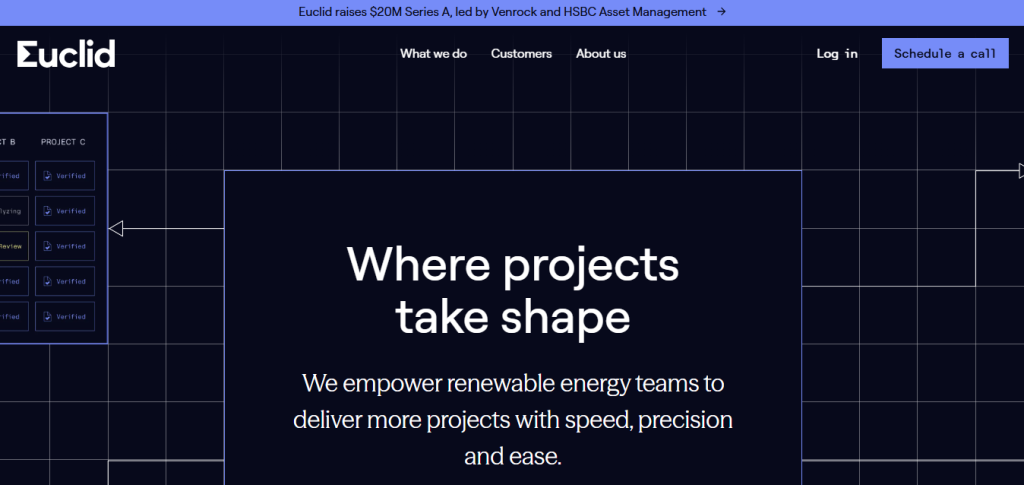Euclid Power Secures $20 Million Series A to Accelerate Renewable Energy Projects
September 13, 2025
byFenoms Startup Research

Euclid Power has raised $20 million in Series A funding, a major milestone that underscores the company’s ambition to become the go-to platform for renewable energy project development. The round was led by Venrock and HSBC Asset Management, with participation from Spero Ventures, Toba Capital, Designer Fund, and Commonweal Ventures.
Founded by Jacob Sandry, Ryan Guay, and Brian DeMaio, Euclid Power is on a mission to help renewable energy teams deliver more projects with speed, precision, and confidence.
What Euclid Power Does
Renewable energy projects - from solar farms to wind installations - are complex, capital-intensive, and often bogged down by fragmented workflows and data silos. Euclid Power provides an integrated platform that centralizes the entire project lifecycle, from origination and development through construction and operations.
By streamlining collaboration, compliance, and data management, Euclid Power enables renewable energy developers to reduce delays, cut costs, and scale projects more efficiently. Their platform ensures that energy teams spend less time on administrative bottlenecks and more time on building the future of clean power.
Why This Funding Round Matters
Securing $20 million in Series A funding is more than just a financial milestone - it signals investor confidence in Euclid’s ability to tackle one of the biggest challenges of the climate transition: scaling renewable projects fast enough to meet global demand.
With the backing of Venrock, HSBC Asset Management, and other prominent investors, Euclid Power has both the capital and expertise to refine its platform, expand its customer base, and lead innovation in clean energy project management.
What makes this particularly insightful for founders is how Euclid approached the problem: instead of focusing on hardware like turbines or solar panels, they zeroed in on process friction - the hidden cost that silently slows billion-dollar industries. And here’s the key value drop: the real competitive advantage often lies in removing complexity, not adding capability.
For startups, this lesson is invaluable. Markets like clean energy already have the tools and capital to build, but the execution gap is massive. By targeting inefficiencies that incumbents have learned to accept, Euclid is proving that the greatest wins come not from reinventing the core technology, but from building the rails that make scaling inevitable. For any founder, it’s a reminder to look not only at what an industry produces, but at how it struggles to produce it. That’s often where the breakthrough lives.
Why It Matters Now
The timing of Euclid’s raise couldn’t be more critical. The world is in a race to decarbonize, and renewable energy deployment must accelerate dramatically. According to the International Energy Agency (IEA), global investment in clean energy reached $1.8 trillion in 2023, but annual investment needs to rise to $4 trillion by 2030 to meet net-zero targets.
At the same time, renewable energy developers face growing challenges: regulatory complexity, permitting delays, and rising supply chain costs. A McKinsey report found that 65% of renewable projects experience delays due to process inefficiencies - a gap that platforms like Euclid are designed to close.
For founders, this illustrates a broader point: the biggest opportunities often emerge where massive capital is flowing but productivity is lagging. That’s where software-led solutions can deliver exponential impact.
Industry Outlook and Market Potential
Euclid Power is positioned in one of the fastest-growing global markets:
- Renewable Energy Growth: The renewable sector is projected to supply 90% of global electricity expansion through 2030 (IEA).
- Project Development Software Demand: The project management software market is expected to surpass $15 billion by 2030 (Allied Market Research), with energy infrastructure representing one of the fastest-adopting verticals.
- Climate Tech Investment: According to PwC, venture funding into climate tech hit $70 billion in 2023, with project enablement tools among the most attractive categories for investors.
- Clean Energy Jobs: BloombergNEF projects that the clean energy sector will create 14 million new jobs by 2030, many requiring streamlined workflows and collaboration tools like Euclid’s.
These figures show why investors are betting big on Euclid: the market for renewable projects is massive, and the software enabling these projects to launch faster has equally transformative potential.
What’s Next for Euclid Power
With its new capital, Euclid Power plans to enhance its platform, expand integrations, and grow its team to support more renewable energy developers worldwide. The funding will also enable deeper investments in AI-driven project insights, regulatory compliance automation, and real-time collaboration features.
As renewable projects become larger and more complex, Euclid Power aims to be the operating system of clean energy project development. If successful, it won’t just speed up workflows - it could accelerate the pace of the global energy transition.









